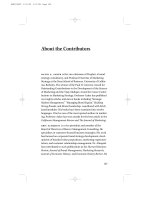Talking about the future
Bạn đang xem bản rút gọn của tài liệu. Xem và tải ngay bản đầy đủ của tài liệu tại đây (13.41 KB, 1 trang )
Talking about the future
There are several ways of talking about the future in English. We can, for example, use the simple future tense,
the going to form or the simple present tense.
The simple future tense
The simple future tense is used to talk about things which are beyond our control. It expresses the future as fact.
We will know our exam results in May.
I will turn thirty this year.
The simple future tense is also used to talk about what we think or believe will happen in the future. It is
commonly used with ‘I think’, ‘I’m sure’, ‘I expect’, ‘I believe’ etc.
I think Germany will win the World Cup.
I think it will rain this evening.
We also use this tense to talk about things which we decide to do at the time of speaking.
‘Mr. Smith is very busy at the moment’ – ‘All right. I will wait.’
‘There is the door bell.’ ‘I’ll go.’
Going to
We use going to to talk about our intentions and plans – things we are ‘going to’ do.
I am going to get a good job.
‘Why are you selling your motorbike?’ ‘I am going to buy a car.’
She is going to get married.
Note that the going to form is always used when we are talking about actions or events that are already decided
upon.
The going to form is also used to talk about something which seems likely or certain because there is outside
evidence.
Look at the sky. It is going to rain.
She is going to have a baby.
Be about to + base form of the verb
This structure is used to talk about the immediate future.
The train is about to leave. (= The train will leave in a short while.)
Don’t go out now. We are about to have dinner.
Stay on top of your writing! Download our grammar guide from www.englishgrammar.org to stay up-to-date.
Powered by TCPDF (www.tcpdf.org)









